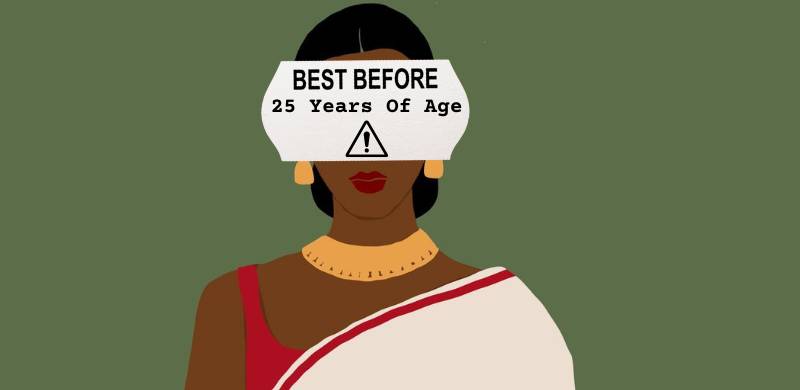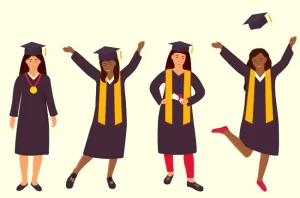
The dominating thought when it comes to marriage in Pakistan —and you can only imagine how many thoughts this subject can garner— is that the younger you are, the better your prospects. It isn’t uncommon for mothers to worry that once their daughter turns 25, her chances of finding a ‘good suitable match’ will dwindle down to a disappointing zero. “Zaada umar ho jati hai toh compromise karna parta hai,” they whisper in hushed tones that pick up an octave or two, or twelve, once they realize their daughters are in fact determined to do away with this arbitrary expiration date. “Uff ye larki,” say the mothers, as they storm out of the room.
via GIFER
For a long time, it was almost entirely unimaginable for a woman to plan her life beyond her 25th year, and that too was being generous. Any aspirations, desires or interests had to be reserved for life after marriage. “Apnay mian ke saath ye shoq pooray kar lena.” These attitudes almost compelled a woman to think that marriage was the only option available if she ever wanted to do any of the things she had dreamed of. Her only chance for independence, for her to have a house of her own in a country where women sometimes don’t even get a room of their own. So, marrying early came with its own set of unique advantageous in the cultural context of Pakistan.
Now, however, times are changing, and they’re changing fast…well, relatively. An increased consciousness about education and higher education, as well as the avenues that are opening as a result, are making many people realize that there might be even more advantages to women studying and building careers instead of settling for marriage at 21. Women themselves are fighting for their rights and pushing against the expectation of marriage by prioritizing their own achievements and targets. Now, just completing university isn’t enough, more and more women are seeking to get master’s degrees and even PhD’s, and at even younger ages than before.

Parents too, are generally becoming more relaxed when it comes to the age they wish to see their daughter married at. There might be an internal panic still, but outwardly, the desire to see their daughter succeed academically or professionally is starting to become almost as important as the desire to see them married. And so, while they still worry about their children getting married while they’re young, there seems to be a slight decrease in that ugly desperation about it. Now, the average age for marriage seems to have shifted slightly higher and is now at 24-26 years of age, which, although modest, is an improvement still. The point isn't to dismiss marrying early, but to stop thinking there's something wrong with not marrying by a certain age, whatever that age might be.
via GIPHY
Of course, as always, the men seem to not be affected by any of this fearmongering about passing a certain age that makes you ‘unmarriageable’. A man can be as old or as young as he wishes, and society will never bat an eyelash at news of his marriage. But God forbid a woman be 30 and unmarried? Scandalous, to the utmost degree. It’s time for society to change this toxic, ageist mindset, and perhaps channel Jennifer Garner from 13 Going On 30 and embrace being ‘thirty, flirty and thriving’. So from now on, 30 is the new 20.
via GIFER
For a long time, it was almost entirely unimaginable for a woman to plan her life beyond her 25th year, and that too was being generous. Any aspirations, desires or interests had to be reserved for life after marriage. “Apnay mian ke saath ye shoq pooray kar lena.” These attitudes almost compelled a woman to think that marriage was the only option available if she ever wanted to do any of the things she had dreamed of. Her only chance for independence, for her to have a house of her own in a country where women sometimes don’t even get a room of their own. So, marrying early came with its own set of unique advantageous in the cultural context of Pakistan.
Now, however, times are changing, and they’re changing fast…well, relatively. An increased consciousness about education and higher education, as well as the avenues that are opening as a result, are making many people realize that there might be even more advantages to women studying and building careers instead of settling for marriage at 21. Women themselves are fighting for their rights and pushing against the expectation of marriage by prioritizing their own achievements and targets. Now, just completing university isn’t enough, more and more women are seeking to get master’s degrees and even PhD’s, and at even younger ages than before.

Parents too, are generally becoming more relaxed when it comes to the age they wish to see their daughter married at. There might be an internal panic still, but outwardly, the desire to see their daughter succeed academically or professionally is starting to become almost as important as the desire to see them married. And so, while they still worry about their children getting married while they’re young, there seems to be a slight decrease in that ugly desperation about it. Now, the average age for marriage seems to have shifted slightly higher and is now at 24-26 years of age, which, although modest, is an improvement still. The point isn't to dismiss marrying early, but to stop thinking there's something wrong with not marrying by a certain age, whatever that age might be.
via GIPHY
Of course, as always, the men seem to not be affected by any of this fearmongering about passing a certain age that makes you ‘unmarriageable’. A man can be as old or as young as he wishes, and society will never bat an eyelash at news of his marriage. But God forbid a woman be 30 and unmarried? Scandalous, to the utmost degree. It’s time for society to change this toxic, ageist mindset, and perhaps channel Jennifer Garner from 13 Going On 30 and embrace being ‘thirty, flirty and thriving’. So from now on, 30 is the new 20.

